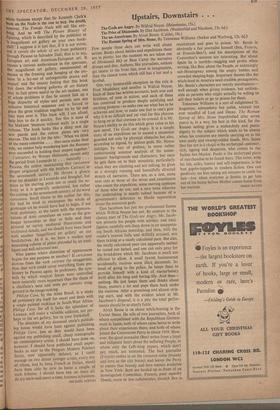Upstairs, Downstairs . . .
The Gods are Angry. By Wilfrid Noyce. (Heinemann, 15s.) The Price of Diamonds. By Dan Jacobson. (Weidenfeld and Nicolson, 13s. 6d.) The un-Americans. By Alvah Bessie. (Calder, 18s.) The Roman Spring of Mrs. Stone. By Tennessee Williams. (Seeker and Warburg, 12s. 6d.) FEW people these days can write well about action. Books about battles and expeditions there arc in plenty; but the moment we are taken out of Divisional HQ or Base Camp the narrative droops and dies. Authors, like journalists, seldom get nearer to the front line, even in imagination, than the closest town which still has a bar and a brothel.
One very honourable exception to this rule is Fred Majdalany and another is Wilfrid Noyce. Each of them has written accounts, both true and fictitious, of men in action; and each of them has contrived to produce deeply satisfying and exciting pictures—to make one see what has to be achieved and how, to make one feel in one's guts why it is so difficult and yet vital for this platoon to hang on or that crevasse to be crossed. It is Mr. Noyce's ability to do this which gives value to his new novel, The Gods are Angry. It is a simple story of an expedition set to ascend a mountain guarded not only by physical obstacles but also, according to legend, by jealous gods. Mr. Noyce indulges, by way of preface, in some rather embarrassing amateur analysis of his moun- taineers' backgrounds and characters; but once he gets them on to their mountain, particularly when they are climbing and not talking, he gives us a strongly running and beautifully directed stretch of narrative. There are, as a zest, some neat cuts at those of the wives and sweethearts who resent the expedition, some moving applause of those who do not, and a nice twist whereby the undertaking is nearly ruined because of a government's deference to Hindu superstition about the mountain gods.
Dan Jacobson has just the professional finesse which Wilfrid Noyce has not. By contrast to the clumsy start of The Gods are Angry, Mr. Jacob- son presents his people with subtlety and intel- ligence, carefully sets them down in an unappetis- ing South African township, and then, with the reader's interest fully and skilfully aroused, sets them ticking at a nicely calculated pace. But alas, the nicely calculated pace can apparently neither be varied nor halted, and one can only pray for the breakdown which Mr. Jacobson is much too efficient to allow. A small Jewish businessman accidentally receives some illicit diamonds. In- stead of going to the police, he keeps them to provide himself with a kind of masturbatory thrill after his long and boring life. And then— nothing. He just keeps them and thinks about them, mutters a bit and pops them back under the mattress. After a promising and almost strik- ing start, and with the evident talent at Mr. Jacobson's disposal, it is a pity the total perfor- mance should be so utterly futile.
Alvah Bessie is on about witch-'ranting in the United States. He tells of two journalists, both of whom sympathised with the Republican Govern- ment in Spain, both of whom came home to write about their experiences there, and both of whom joined the Communist Party in about 1939. How- ever, the good journalist (Ben) writes from a loyal and indignant heart about the suffering People, in whom only the Left-wing papers, which don't pay much, are interested. The bad journalist (Francis) cashes in on the romance value (brandy and love as the city burns), and leaves the Party to ensure that brandy and love remain available in New York. Both are hauled up in front of an Investigation Committee. Francis, poor squashy liberal, more or less collaborates, staunch Ben is
recalcitrant and goes to prison. Mr. Bessie is obviously a fair journalist himself (Ben, Francis, or Francis-Ben?), and his descriptions of the Committee's sessions are interesting. But about Spain he is terrible—nagging and prolix when writing, like Ben, about the People, or sickeningly sub-Hemingway among the empty bottles and crowded sleeping-bags. Important themes like the witch-hunt in America need credible protagonists.. Mr. Bessie's characters are merely mouthpieces— well enough when giving evidence, but unthink- able as persons who might actually be willing to sell their beliefs or go to prison for them.
Tennessee Williams is a sort of enlightened St. Augustine, admonitory but polite, tolerant but ever mindful of Lust and Decay. The Roman Spring of Mrs. Stone (republished after seven years) is, in a way, his best in this kind, for the Roman setting gives a melancholy and poetic dignity to the subject which tends to be absent when his creatures are merely carrying on in his own seedy and swamp-ridden South. Mrs. Stone (but her sex is a choix) is the archetypal customer, rich, ageing and desperate, who comes to the Italian Sex-Market. Paolo is the archetypal piece of merchandise to be found there. This latter, with his lies, sulks, beauty and self-importance, is the best gigolo-tappette in modern fiction. One can positively see him taking ten minutes to comb his hair—just when everyone is frantic to get him out of the house before Mother comes home from


































 Previous page
Previous page